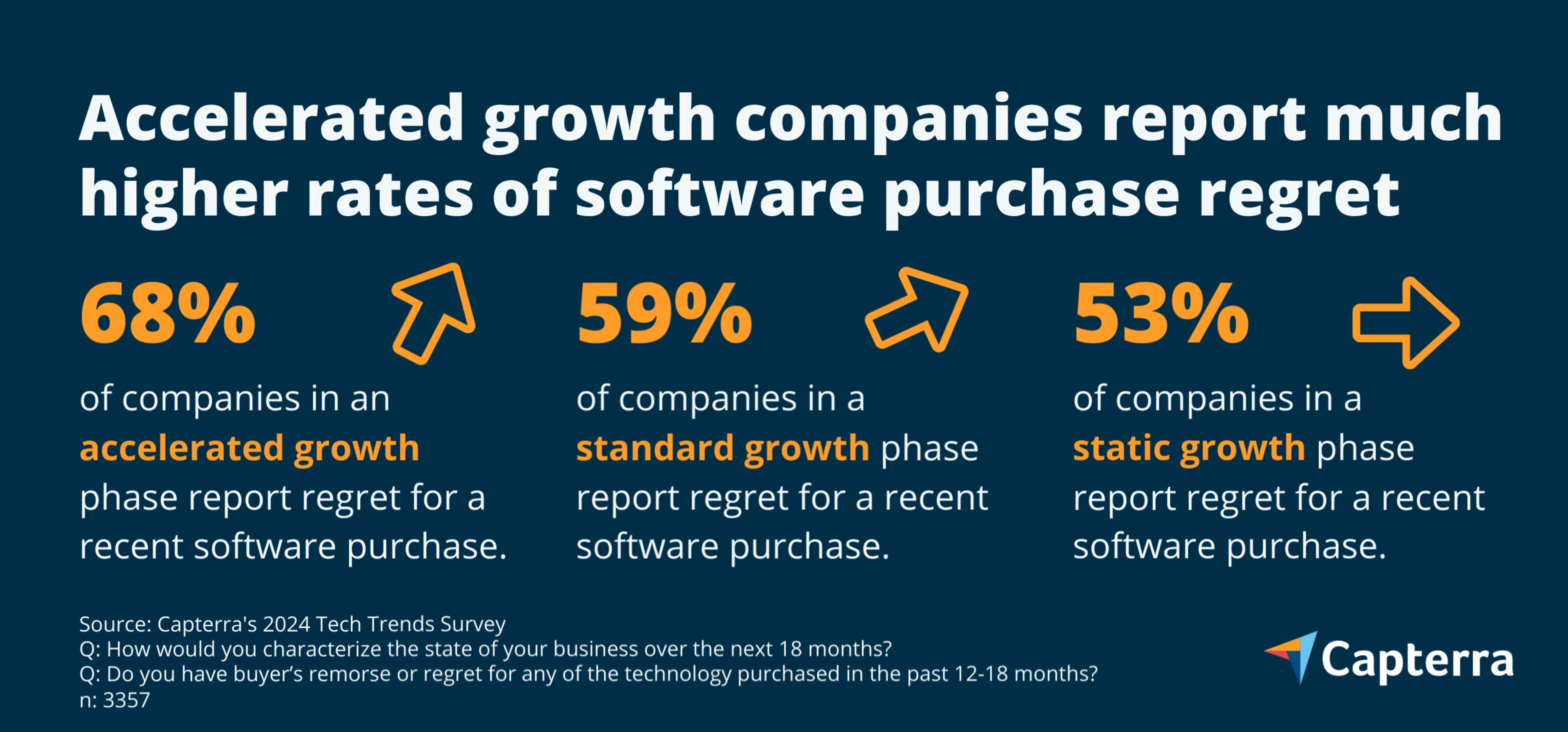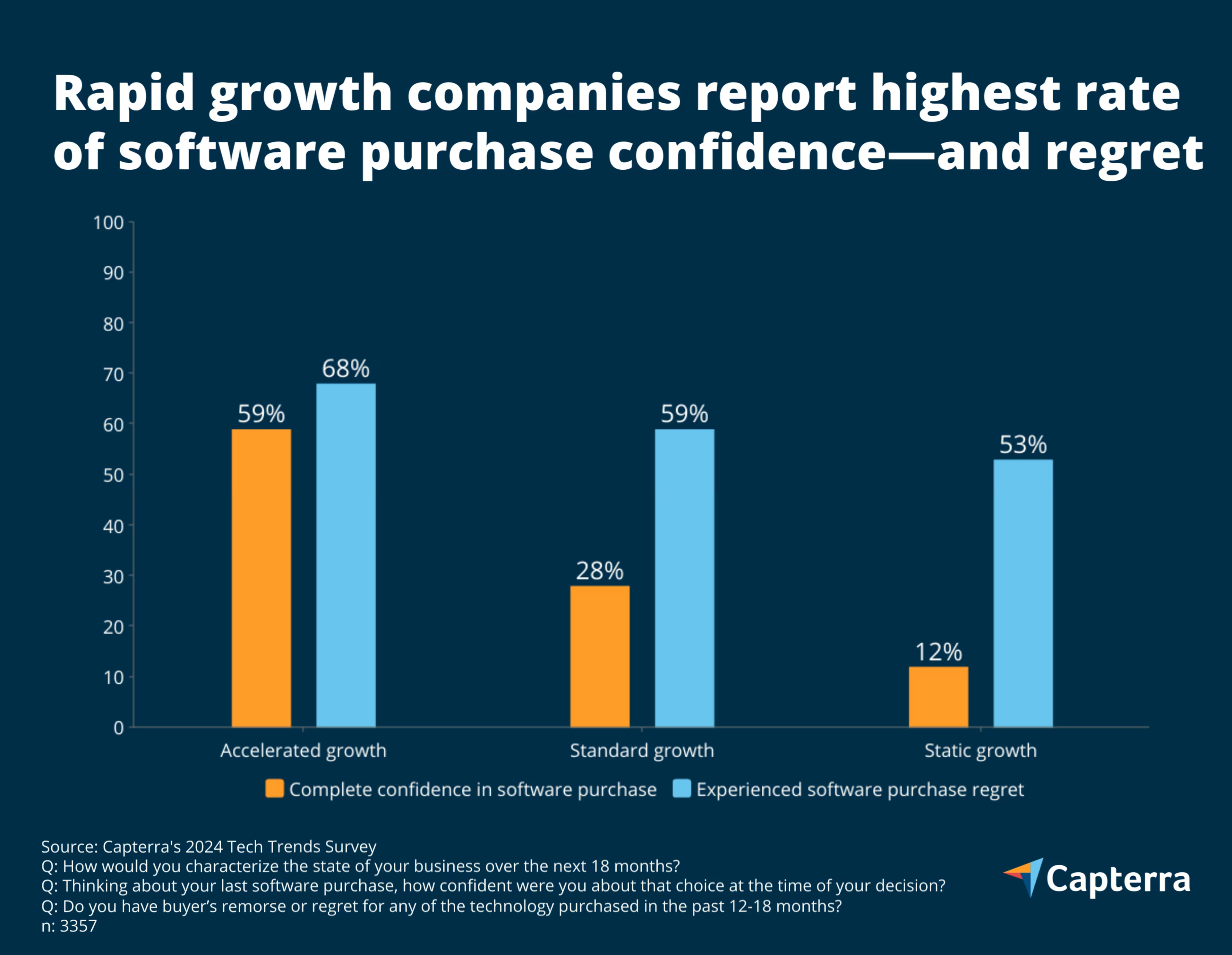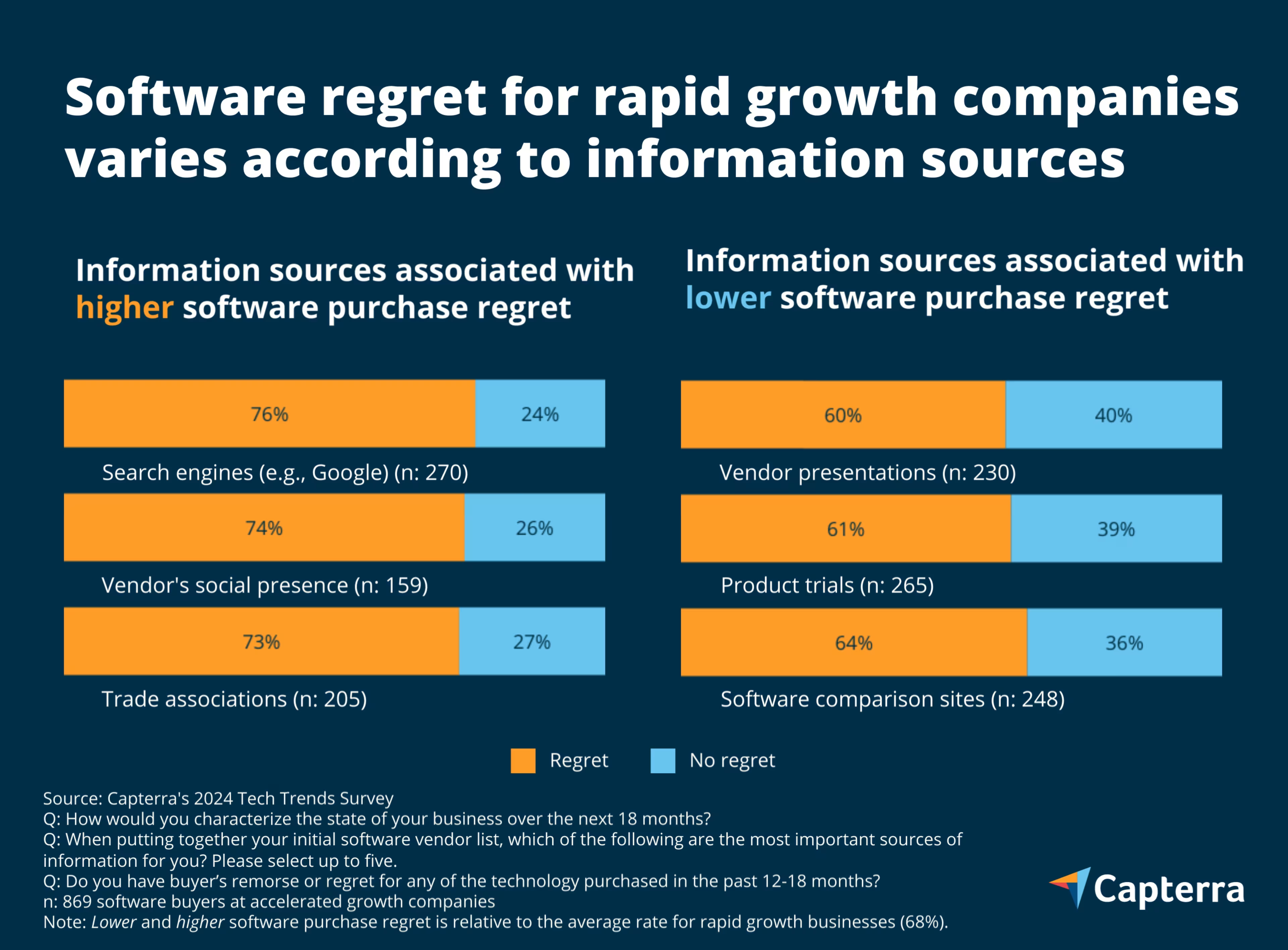Let's explore why some companies experience software purchase regret more than others, and what can be done about it.
All companies face challenges during the software purchase process, but Capterra’s 2024 Tech Trends Survey finds that hurdles are highest for businesses experiencing an accelerated growth phase (often startups).
Our survey finds that software purchase regret is experienced by 60% of businesses within 18 months of the purchase. When broken out among business phases, 68% of accelerated growth companies report regret compared to only 59% of companies in a standard growth phase and 53% of those in a static growth phase.
/ Key insights
More than two in three accelerated growth businesses experience software purchase regret (68%), well above the 60% average.
Those same companies have a disproportionate amount of certainty about software purchases, with 59% claiming complete confidence in their most recent purchase.
Two in five (41%) rapidly growing businesses say a bad software purchase made their company less competitive.
Sources of information during the software evaluation period appear to impact eventual purchase regret—search engines are the worst offenders.
If your company is a startup or simply experiencing rapid growth, our research will help you to get ahead of software purchase regret and other challenges before they arise so you can make better decisions moving forward.

Uncertainty is better than hubris when approaching a new software purchase
Most accelerated growth companies go into the software purchase completely confident that they’ve made the right choice, only to regret their decision soon thereafter.
About three in five (59%) rapidly growing companies go into the purchase process “completely confident,” nearly twice the 33% average. Yet these same companies are much more likely to experience software purchase regret (68%) compared to the 60% average. Clearly, there are disconnects somewhere along the way.

Such certainty might stem from inexperience with poor software purchases. Our survey shows that accelerated growth businesses tend to have fewer years in business compared to those in growth or static phases. But that’s not the only factor—compared to those in steady growth or static phases, our research reveals companies experiencing accelerated growth have more trouble:
Identifying the right technologies to adopt
Clarifying goals and desired outcomes
Managing projects efficiently
Managing stakeholders
For all of these reasons and more, it’s no surprise they also suffer a significantly higher rate of regret for software purchases. Such purchases impact productivity and competitiveness for rapid growth companies far more than those in standard growth or static phases. In fact, 41% of rapid growth companies say a bad software purchase made the business less competitive in the market, compared to only 30% of those in growth or static phases.
Regardless of inflated purchase regret, 75% of rapid growth companies still plan to spend more on software in 2024 (likely due in part to replacing bad purchases) than in 2023.
Recommendations to avoid software purchase regret
Capterra research shows that rapid growth companies report lower rates of regret (compared to their 68% average) when they take advantage of vendor presentations (60%), use product trials (61%), and leverage software comparison sites like Capterra (64%) during their software research and evaluation process.
Conversely, companies that rely on search engines (e.g., Google) when conducting research for their software search report a much higher rate of regret (76%). Those gleaning information from the vendor’s social presence come in at 74%, and those looking to trade associations land at 73%.

Recommendation: To reduce the odds of purchase regret, take advantage of vendor presentations when offered to gain a full understanding of the product. Emphasize the use of software comparison websites during your search and take advantage of product trials to ensure the software is a good fit for your employees and their workflows. Meanwhile, consider reducing reliance on information obtained from search engines, trade associations, and the vendor’s social presence when researching software.
Here's how we can help: Capterra offers millions of verified reviews for the software buyer’s needs. With our advanced filtering options, you can evaluate software for specific attributes such as ease of use and customer service, and read detailed comments about what businesses like yours like and dislike about each tool. That way, you can find technology that fits your business, without the surprises.
The top vendor-related regret factor: Difficult implementation
The top vendor-related factor that led to purchase regret is a problematic handoff between sales and implementation, voiced by 50% of rapid growth companies compared to the 43% average.
Once the purchase has been made and transition to a new product has begun, undoing the damage of a poor purchase can be difficult and costly—36% say they will replace regrettable software with technology from another vendor while 28% will cancel their contract (potentially incurring significant fees).
Recommendation: Work with vendors that offer robust onboarding and implementation support. Gain clarity about post-sales support options prior to purchase to ensure your team will receive the attention it needs as implementation begins. Be sure to test response times during product trials and check customer reviews for comments about post-sales support. Beyond vendor support, ensure your team understands why new software is being adopted and how it will benefit them. Designate superusers to trial the software ahead of purchase who can then assist with onboarding others during implementation. If your software implementation plan is somewhat complicated, consider using task management software to plan steps and track progress.
The top product-related regret factor: Too complex
The top product-related factor that led to purchase regret is buying software that is more advanced than needed (36% compared to the 29% average). This finding suggests that accelerated growth companies are anticipating a need for more complex technology than they end up having the need for, or the ability to use effectively.
Recommendation: Purchase software that solves problems you have today while ensuring that it can scale as you grow. Focus on implementation and integration rather than anticipation.
Learn more about software purchase regret
There are numerous steps your organization can take to mitigate software purchase regret, from improving stakeholder alignment to clarifying goals with the vendors. To learn more, check out the following report: Capterra's 2024 Tech Trends Report: An In-Depth Look at Software Purchase Regret
Capterra’s 2024 SMB Tech Trends Annual State of Software Adoption Reports capture global trends across industries and reveal how small to midsize business leaders are adopting technologies to embrace change, optimize efficiency, and accelerate growth. Our reports are designed to support decision-makers with the insights they need to embrace the right technology and services.
2024 U.S. Tech Trends Report: 58% of Businesses Regret a Recent Software Purchase
Capterra’s 2024 Tech Trends Report: Insights From Marketers To Watch
Capterra’s 2024 Tech Trends Report: How Retailers Can Avoid Regrettable Software Purchases
Capterra's 2024 Tech Trends Report: Software Selection Best Practices for Financial Firms
